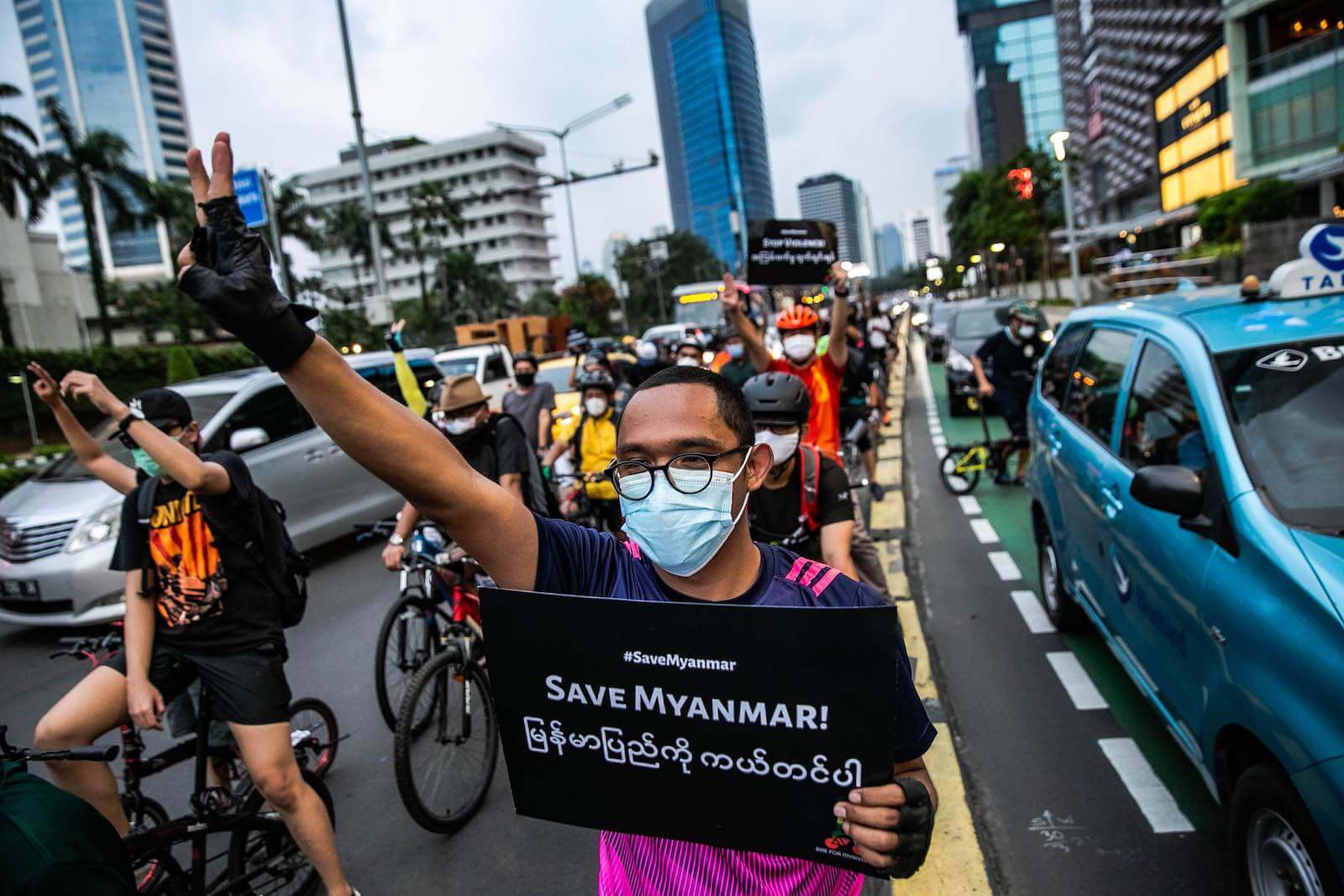After widespread international sanctions and condemnations failed to curb the Burmese military’s brutal campaign of suppression and killing in the aftermath of the February 1 coup, the Association of Southeast Asian Nations (ASEAN) stepped in on April 24 to convene a “special summit” in Jakarta to help resolve the situation.
Given the increasing focus on the grouping’s “centrality” in the Indo-Pacific—which refers to the idea that ASEAN should be the driving force or at least pivotal to any discussions or actions in the region—the move was billed as a critical step forward to stall a member state from descending into complete chaos. However, the meeting was hardly an achievement, yielding bare minimum results and bringing into question the group’s ability to effectively tackle a rapidly unfolding security crisis in the region.
In principle, the conference’s outcomes were all agreeable. In a five-point consensus, the leaders called for the cessation of violence, encourages increased dialogue between the conflict parties, pushed for humanitarian assistance to be allowed in, and decided to set up an ASEAN envoy to head a delegation on a visit to Myanmar. However, the summit’s recognition of only the Tatmadaw and its chief Sen. Gen. Min Aung Hlaing (and exclusion of the newly formed civilian-led National Unity Government) raises a problematic possibility of the bloc becoming vulnerable to the whims of the Burmese military and further fuelling the nation’s nascent civil war.
The language used in the official statement that followed the meet furthers this concern, in that it does not explicitly condemn the coup, call for the immediate release of the thousands of political prisoners, or advocate for the swift restoration of democratic governance based on the November general elections. In fact, the release also calls for an end to violence among “all parties,” thereby shifting the overwhelming responsibility of atrocities in Myanmar away from the military leadership. Furthermore, it provides no details on a timetable for enforcing the agreed consensus, or any strategy on how and when the ASEAN would engage with the NUG.
Also read: Myanmar’s Experiment With Democracy Was Always Susceptible to Failure. Here’s Why.
While deeply troubling, the lack of any pointed criticism towards Myanmar from ASEAN is also a product of the group’s own structural shortcomings. The organisation has become infamous for its strict adherence to the principle of non-interference in the affairs of member states since its inception. Though some have applauded ASEAN for its marked departure from its usual indirect and informal diplomatic style by convening a summit on the Myanmar issue, it’s worth noting that according to official statements, the high-level ‘Leader’s Meeting’ gathering was “convened with the view to advance ASEAN Community building, hasten recovery from the Coronavirus Disease 2019 (COVID19) pandemic, strengthen ASEAN’s external relations and address pressing issues of common interest to all ASEAN Member States.” The situation in Myanmar was only recognised near the end of the 1,000-word statement.
This practice of keeping a safe distance from contentious issues is also enshrined in its 2008 charter, which before touching on the Association’s commitments to rights and democracy, speaks of mutual respect and freedoms of member states, non-intervention, and freedom from external interference, subversion, and coercion. Experts argue that this is intentional, and a means for the bloc to tout the importance of good governance, fundamental freedoms, human rights, and rule of law without actually having to follow up with real action. Moreover, rising authoritarianism across the region in recent years has made the current way of functioning (i.e. the consensus-driven approach) even more palatable to those who fear that a more interventionist approach might threaten their own grip on power.
Whether it is Thailand, the Philippines, Malaysia, or Cambodia, much of Southeast Asia appears to be in a rapid democratic retreat. Prayuth Chan-o-cha, who led Thailand’s last coup, is still the prime minister of the country, and has spent much of his time in office brutally cracking down on dissent. Filipino President Rodrigo Duterte has directed thousands of extrajudicial killings, Malaysia’s old and shockingly corrupt establishment is back in power, and long-time Cambodian Prime Minister Hun Sen has dismantled all opposition to pave the way for family political dynasty.
Against this backdrop, it is no surprise that the ASEAN has not done more to advance democratic reform in Myanmar. However, rising oppression has also hardened the people’s resolve to fight against it, and given that the fallout of a civil war against the Tatmadaw will largely be felt in the countries of the bloc, it is in their best interests to take meaningful action and press for real change in Naypyidaw. Such measures could include temporarily suspending Myanmar’s membership to the group, like in 2006, when it was forced to give up its scheduled chairmanship over concerns of growing military rule. Additionally, apart from security concerns, the body’s response to the Myanmar crisis will also be crucial in determining its global relevance. The debate around “ASEAN centrality” has picked up in the wake of China’s growing clout in the region, and with the US turning increasingly inward in its own policies, and the bloc will have to pick up the pace to demonstrate its willingness and ability to live up to its high and mighty expectations of being a viable pivotal power in the region.

